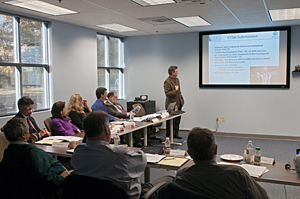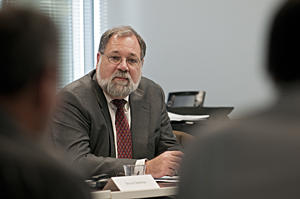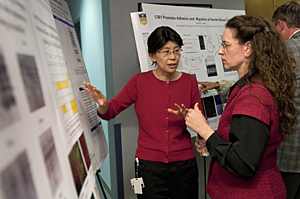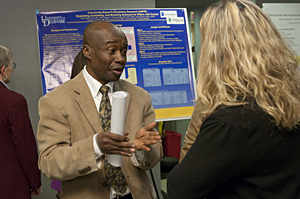

ADVERTISEMENT
- Rozovsky wins prestigious NSF Early Career Award
- UD students meet alumni, experience 'closing bell' at NYSE
- Newark Police seek assistance in identifying suspects in robbery
- Rivlin says bipartisan budget action, stronger budget rules key to reversing debt
- Stink bugs shouldn't pose problem until late summer
- Gao to honor Placido Domingo in Washington performance
- Adopt-A-Highway project keeps Lewes road clean
- WVUD's Radiothon fundraiser runs April 1-10
- W.D. Snodgrass Symposium to honor Pulitzer winner
- New guide helps cancer patients manage symptoms
- UD in the News, March 25, 2011
- For the Record, March 25, 2011
- Public opinion expert discusses world views of U.S. in Global Agenda series
- Congressional delegation, dean laud Center for Community Research and Service program
- Center for Political Communication sets symposium on politics, entertainment
- Students work to raise funds, awareness of domestic violence
- Equestrian team wins regional championship in Western riding
- Markell, Harker stress importance of agriculture to Delaware's economy
- Carol A. Ammon MBA Case Competition winners announced
- Prof presents blood-clotting studies at Gordon Research Conference
- Sexual Assault Awareness Month events, programs announced
- Stay connected with Sea Grant, CEOE e-newsletter
- A message to UD regarding the tragedy in Japan
- More News >>
- March 31-May 14: REP stages Neil Simon's 'The Good Doctor'
- April 2: Newark plans annual 'wine and dine'
- April 5: Expert perspective on U.S. health care
- April 5: Comedian Ace Guillen to visit Scrounge
- April 6, May 4: School of Nursing sponsors research lecture series
- April 6-May 4: Confucius Institute presents Chinese Film Series on Wednesdays
- April 6: IPCC's Pachauri to discuss sustainable development in DENIN Dialogue Series
- April 7: 'WVUDstock' radiothon concert announced
- April 8: English Language Institute presents 'Arts in Translation'
- April 9: Green and Healthy Living Expo planned at The Bob
- April 9: Center for Political Communication to host Onion editor
- April 10: Alumni Easter Egg-stravaganza planned
- April 11: CDS session to focus on visual assistive technologies
- April 12: T.J. Stiles to speak at UDLA annual dinner
- April 15, 16: Annual UD push lawnmower tune-up scheduled
- April 15, 16: Master Players series presents iMusic 4, China Magpie
- April 15, 16: Delaware Symphony, UD chorus to perform Mahler work
- April 18: Former NFL Coach Bill Cowher featured in UD Speaks
- April 21-24: Sesame Street Live brings Elmo and friends to The Bob
- April 30: Save the date for Ag Day 2011 at UD
- April 30: Symposium to consider 'Frontiers at the Chemistry-Biology Interface'
- April 30-May 1: Relay for Life set at Delaware Field House
- May 4: Delaware Membrane Protein Symposium announced
- May 5: Northwestern University's Leon Keer to deliver Kerr lecture
- May 7: Women's volleyball team to host second annual Spring Fling
- Through May 3: SPPA announces speakers for 10th annual lecture series
- Through May 4: Global Agenda sees U.S. through others' eyes; World Bank president to speak
- Through May 4: 'Research on Race, Ethnicity, Culture' topic of series
- Through May 9: Black American Studies announces lecture series
- Through May 11: 'Challenges in Jewish Culture' lecture series announced
- Through May 11: Area Studies research featured in speaker series
- Through June 5: 'Andy Warhol: Behind the Camera' on view in Old College Gallery
- Through July 15: 'Bodyscapes' on view at Mechanical Hall Gallery
- More What's Happening >>
- UD calendar >>
- Middle States evaluation team on campus April 5
- Phipps named HR Liaison of the Quarter
- Senior wins iPad for participating in assessment study
- April 19: Procurement Services schedules information sessions
- UD Bookstore announces spring break hours
- HealthyU Wellness Program encourages employees to 'Step into Spring'
- April 8-29: Faculty roundtable series considers student engagement
- GRE is changing; learn more at April 15 info session
- April 30: UD Evening with Blue Rocks set for employees
- Morris Library to be open 24/7 during final exams
- More Campus FYI >>
10:28 a.m., Nov. 17, 2010----Since 2001, Wesley College has established a joint undergraduate program in biological chemistry with Delaware State University (DSU), enrollment in the biotechnology program at Delaware Technical and Community College has jumped from eight students to 187, and DSU has gained access to library resources critical to scientific research and education.
These success stories are just a few examples of the dozens of accomplishments associated with the Delaware IDeA Network of Biomedical Research Excellence (INBRE) program. This was the message shared at a Delaware INBRE External Advisory Board (EAB) meeting on Nov. 11-12 at the Nemours/A.I. duPont Hospital for Children (Nemours).
During the meeting, the INBRE EAB reviewed the progress of 15 ongoing pilot research projects, the activities of seven centralized core instrumentation centers, and a thriving undergraduate research and professional development program that recently engaged 61 students in biomedical research activities.
Funded by the National Institutes of Health (NIH) National Center for Research Resources (NCRR) to establish and grow a statewide biomedical research capacity, Delaware INBRE is administered by the University of Delaware. Karl Steiner, senior associate provost for research development at UD, is principal investigator, and Steven Stanhope, professor of kinesiology and applied physiology, is program coordinator.
The INBRE partnership -- which includes Wesley, DSU, Delaware Tech, UD, Nemours and Christiana Care Health System (CCHS) -- has secured more than $45 million in competitive grants from NIH-NCRR since 2001, Steiner said.
Total NIH funding to Delaware institutions has increased five-fold over the past 15 years. This increase is more than twice the amount that would be expected based on NIH spending growth.
Delaware INBRE funds have supported a broad array of efforts, including faculty startups, infrastructure alterations, instrumentation, undergraduate research, summer internships, and developmental research projects focusing on cancer, cardiovascular science, and neuroscience. Students and researchers affiliated with the program recently won seven out of 41 national awards at the Third National IDEA Symposium for Biomedical Research Excellence
“The catalytic effect of this program can not be overemphasized,” said Mark Barteau, senior vice provost for research and strategic initiatives at UD, and chair of the Delaware INBRE Steering Committee.
Barteau credited Delaware INBRE with helping to launch the Delaware Health Sciences Alliance (DHSA), spurring the growth of a bioinformatics capability in Delaware, laying the groundwork for a $17-million cyberinfrastructure grant from NIH and the National Science Foundation (NSF), and providing a strong foundation for a DHSA proposal to NIH for a Center for Translational Science Award, which is currently under review.
Representatives from all six partners shared not only success stories but also challenges, including recruiting and retaining students, keeping up with technology, building capacity for undergraduate research, obtaining release time for faculty and clinicians to conduct research, and recruiting research subjects.
One new INBRE effort will focus on improving the infrastructure for recruitment and scheduling of subjects for biomedical research. “We want to do a better job of connecting healthcare researchers with the public,” Stanhope said.
Other innovations cited included cluster grants offered by Nemours to groups of independent but interrelated projects in focus areas related to children's health.
“INBRE has really helped us to leverage our expertise so that we can attract more external funding,” said Vicky Funanage, director of biomedical research at Nemours. “We're bringing our resources together and coming up with innovative ways to take our work from bench to bedside and then to the clinic and the community.
The Delaware INBRE EAB includes the following members: Mark Lively, Wake Forest University School of Medicine; Michael King, University of Virginia; Karen Knudsen, Thomas Jefferson University; David Landsman, National Institutes of Health; Michael Liebman, Windber Research Institute, Strategic Medicine, Inc.; Daniel Perl, Uniformed Services University; Richard Quisenberry, AMTEX Partnership; and David Speicher, Wistar Institute
Article by Diane Kukich
Photos by Evan Krape




